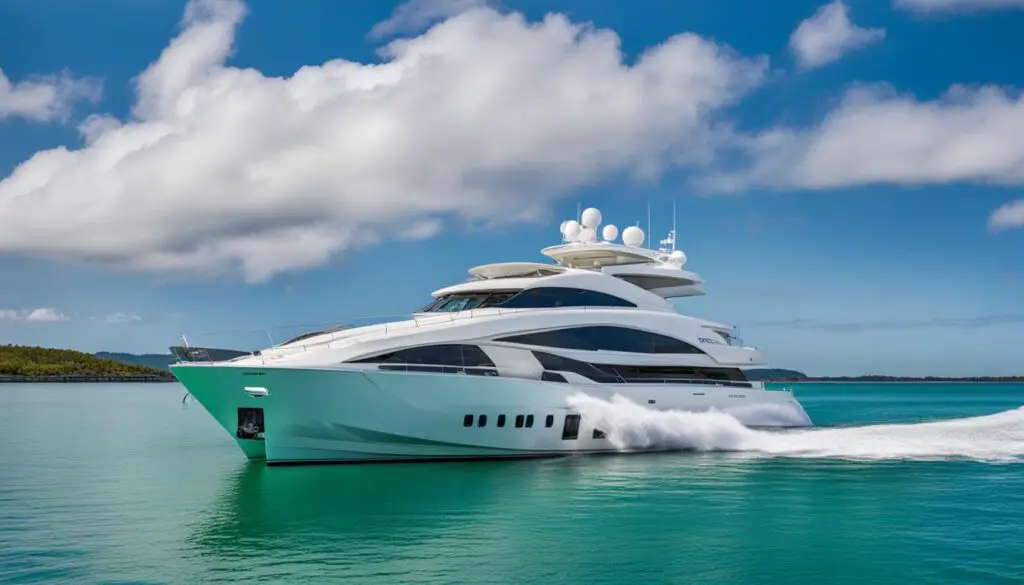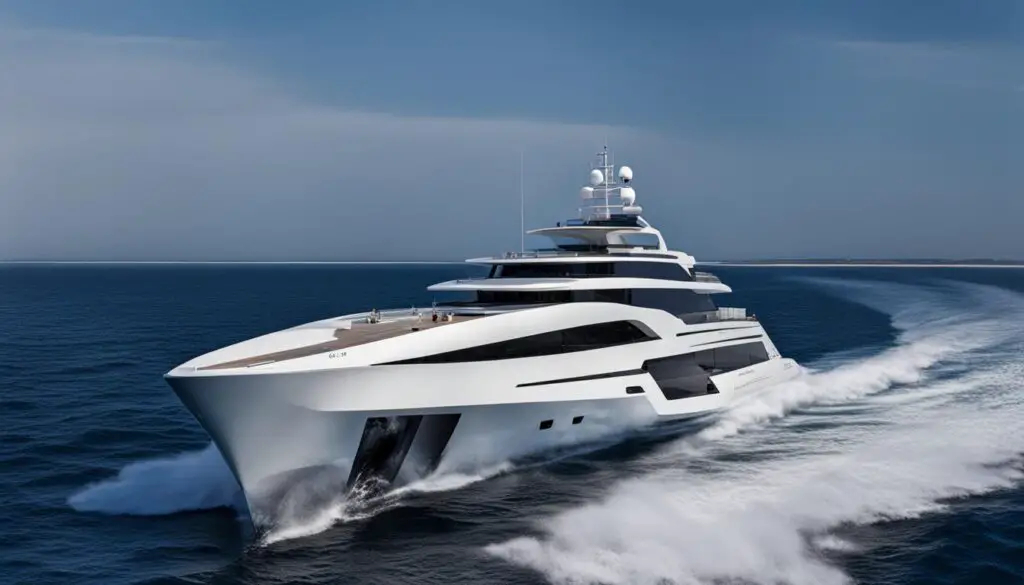When it comes to yachts, fuel plays a crucial role in determining performance, efficiency, and environmental impact. Yachts can run on a variety of fuel types, each with its own advantages and disadvantages. So, what fuel do yachts use? Let’s explore the different options available.
The most common and widely available fuel for yachts is diesel. Diesel fuel offers high energy density, excellent performance, fuel efficiency, and durability. It is the preferred choice for many yachts, especially motor yachts, catamarans, trawlers, superyachts, and megayachts. However, different types of yachts may require different fuel types. Sailing yachts, for example, often use diesel, biodiesel, or electric fuel systems.
Aside from diesel, other fuel options for yachts include gasoline, bio-diesel, natural gas, propane, and electric/hybrid systems. Gasoline provides fast acceleration and is less expensive than diesel, but it has lower energy density, lower fuel efficiency, and is less durable. Bio-diesel is a renewable and eco-friendly option, but it has limited availability and can be more expensive than diesel. Natural gas and propane offer lower emissions and fuel costs, but they have their own limitations in terms of availability and infrastructure requirements.
Electric and hybrid fuel systems are also gaining popularity in the yachting industry. Electric motors provide quiet operation, zero emissions, and low operating costs. However, they have a limited range and speed compared to traditional engines. Hybrid systems combine electric motors and batteries with a diesel or gasoline generator for backup power.
Choosing the right fuel for your yacht depends on various factors such as yacht type, size, range, and environmental considerations. Understanding the advantages and disadvantages of each fuel type is essential for making informed decisions that optimize performance, efficiency, and environmental impact.
Key Takeaways:
- Yachts can run on diesel, gasoline, bio-diesel, natural gas, propane, and electric/hybrid fuel systems.
- Diesel fuel is the most common and widely available option, offering high energy density and good performance.
- Gasoline provides fast acceleration but has lower energy density and fuel efficiency compared to diesel.
- Bio-diesel is renewable and eco-friendly but has limited availability and higher cost.
- Electric motors produce zero emissions and have low operating costs but have limited range and require frequent charging.
- Natural gas and propane offer lower emissions and fuel costs but have limitations in availability and infrastructure.
- The choice of fuel depends on factors like yacht type, size, range, and environmental considerations.
Diesel Fuel for Yachts
Diesel fuel is the most common type of fuel used in yachts. It offers high energy density, good performance, fuel efficiency, and durability. Diesel engines are more fuel-efficient and require less maintenance compared to gasoline engines.
However, diesel fuel is generally more expensive than gasoline, and diesel engines have slower acceleration. Diesel fuel also produces more emissions than gasoline, which can have a negative impact on the environment.
In summary, yacht owners often choose diesel fuel for its numerous advantages, including high energy density, performance, fuel efficiency, and durability. However, it is important to consider the disadvantages, such as higher cost and slower acceleration, as well as the environmental impact of diesel emissions.
Gasoline Fuel for Yachts
Gasoline is another fuel option for yachts, particularly smaller personal boats. Gasoline engines provide fast acceleration and are less expensive than diesel engines. However, gasoline does come with some disadvantages compared to diesel fuel.
One of the major disadvantages of gasoline is its lower energy density. This means that a smaller volume of gasoline contains less energy compared to an equal volume of diesel fuel. As a result, yachts running on gasoline may require more frequent refueling compared to those using diesel.
Another drawback of gasoline is its lower fuel efficiency. Gasoline engines tend to consume more fuel compared to diesel engines to produce the same amount of power, resulting in higher fuel costs for yacht owners.
Additionally, gasoline engines are generally less durable than diesel engines. They require more maintenance and may need to be replaced more frequently. This can lead to higher maintenance and replacement costs for yacht owners who opt for gasoline fuel.
Despite these disadvantages, the fast acceleration and lower upfront cost of gasoline engines make them a popular choice for smaller yachts and personal boats.
To summarize, the advantages of using gasoline as a fuel for yachts include fast acceleration and lower upfront cost. However, the disadvantages include lower energy density, lower fuel efficiency, and reduced engine durability.
Bio-diesel Fuel for Yachts
Bio-diesel fuel offers yacht owners a renewable and environmentally friendly alternative to traditional diesel fuel. It is derived from sustainable sources such as vegetable oils, animal fats, or recycled restaurant grease. This eco-conscious fuel can be used in any diesel engine with minimal modifications, making it a viable option for yacht owners.
One of the key advantages of bio-diesel is its lower emission profile compared to conventional diesel fuel. It produces fewer greenhouse gases and air pollutants, making it a more environmentally conscious choice for yacht owners who prioritize sustainability.
However, it’s important to note that there are some limitations to consider when opting for bio-diesel as a fuel choice. One of the main disadvantages is its limited availability. Bio-diesel may not be as widely accessible as traditional diesel fuel, which may pose challenges when refueling in certain locations.
Another factor to consider is the cost. Bio-diesel is generally more expensive than conventional diesel, primarily because of the additional steps required in the production process. Yacht owners should weigh the environmental benefits against the potentially higher fuel costs associated with bio-diesel.
Despite its limitations, bio-diesel presents a cleaner and greener option for yacht owners who are committed to reducing their carbon footprint. By using bio-diesel fuel, yachts can contribute to a more sustainable marine industry and help preserve our oceans for future generations.

Electric and Hybrid Fuel Systems for Yachts
Electric and hybrid fuel systems are gaining popularity in the yachting industry as sustainable and efficient alternatives. These systems utilize electric motors and batteries to power the yacht, with a diesel or gasoline generator as a backup.
One of the main advantages of electric motors is their environmental friendliness. They produce zero emissions, which significantly reduces the yacht’s carbon footprint and helps protect the marine ecosystem. This makes them an excellent choice for eco-conscious yacht owners and operators looking for an eco-friendly yacht fuel option.
In addition to being eco-friendly, electric motors offer several other benefits. They provide quiet operation, allowing for a peaceful and serene yachting experience. They also have low operating costs, as electricity is typically less expensive compared to traditional fuels like diesel and gasoline.
However, it’s important to note that electric motors do have some limitations. They have a limited range and speed compared to traditional engines, which may restrict the yacht’s cruising capability. Yachts powered solely by electric motors may require frequent charging, which can be a challenge during long journeys or in areas with limited charging infrastructure.
The initial cost of electric propulsion systems is generally higher than that of traditional engines, which can deter some yacht owners from adopting this technology. However, the long-term cost savings in terms of fuel consumption, maintenance, and environmental impact may outweigh the higher upfront investment.
To summarize, electric and hybrid fuel systems offer a greener and more efficient option for yachts. They prioritize environmental sustainability, reduce operating costs, and provide quieter operation. However, they do have limitations in terms of range, speed, and initial cost. Yacht owners should carefully consider their specific needs, cruising requirements, and sustainability goals when deciding whether to adopt electric or hybrid propulsion systems.
| Advantages of Electric Motors for Yachts | Disadvantages of Electric Motors for Yachts |
|---|---|
|
|
Natural Gas and Propane as Yacht Fuel Options
Natural gas and propane are alternative fuel options for yachts. These fuels offer advantages and disadvantages that yacht owners should consider when choosing the best option for their vessel.
Natural gas, also known as compressed natural gas (CNG), is a cleaner-burning fuel compared to diesel and gasoline. It produces lower emissions, which is beneficial for the environment. Additionally, natural gas typically costs less than diesel and gasoline, making it a cost-effective choice for fueling yachts.
However, there are a few drawbacks to using natural gas as yacht fuel. One major disadvantage is the limited availability of natural gas refueling infrastructure. This means that yacht owners might have limited options when it comes to refueling their vessels. Additionally, converting a yacht to use natural gas can be expensive, requiring specialized equipment and modifications.
Propane, also known as liquefied petroleum gas (LPG), is another fuel option for yachts. It is widely available at marinas, making it convenient for yacht owners to refuel their vessels. Propane produces lower emissions compared to diesel and gasoline, contributing to a cleaner and greener sailing experience.
However, propane has some limitations as well. It has a limited range, meaning that yacht owners may need to refuel more frequently compared to diesel or gasoline-powered yachts. Propane also requires specialized infrastructure for storage and refueling, which might not be readily available in all areas. Additionally, propane has a higher initial cost compared to diesel and gasoline, which is something yacht owners should consider when budgeting for fuel expenses.
Despite these limitations, both natural gas and propane offer viable alternatives for yacht owners who prioritize environmental sustainability and cost-effectiveness. The choice between natural gas and propane ultimately depends on factors such as availability, infrastructure, range requirements, and upfront costs.

Conclusion
Yachts offer a range of fuel options to cater to different needs and preferences. From diesel to gasoline, bio-diesel to electric/hybrid, natural gas to propane, each fuel type has its own set of advantages and disadvantages. The decision on which fuel to choose depends on factors such as the type of yacht, its size, range, and environmental considerations.
To optimize performance, efficiency, and minimize environmental impact, it is crucial for yacht owners and operators to have a clear understanding of the different fuel types and make informed decisions. Regular maintenance and adherence to the manufacturer’s recommendations regarding fuel type are vital to ensuring optimal yacht performance and longevity.
Whether it’s the high energy density and durability of diesel, the fast acceleration of gasoline, the renewable and eco-friendly nature of bio-diesel, or the quiet operation and low emissions of electric/hybrid systems, there is a fuel option for every yacht. It’s about finding the right balance between performance, efficiency, and environmental impact that best suits the specific yacht and its intended use.
So, if you’re a yacht owner or operator, take the time to research, consider your options, consult with experts, and make an informed decision. By doing so, you will not only optimize your yacht’s performance and fuel efficiency but also contribute to a more sustainable and eco-friendly boating industry.
FAQ
What fuel options do yachts have?
Yachts can run on a variety of fuels, including diesel, gasoline, biofuels, natural gas, propane, and electric/hybrid fuel systems.
What is the most common fuel used in yachts?
Diesel fuel is the most common type of fuel used in yachts due to its high energy density, performance, fuel efficiency, and durability.
What are the advantages of diesel fuel for yachts?
Diesel fuel offers high energy density, good performance, fuel efficiency, and durability. Diesel engines are also more fuel-efficient and require less maintenance compared to gasoline engines.
What are the disadvantages of diesel fuel for yachts?
Diesel fuel is generally more expensive than gasoline and can produce more emissions, which can have a negative impact on the environment. Diesel engines also have slower acceleration compared to gasoline engines.
Can yachts use gasoline as fuel?
Yes, gasoline is another fuel option for yachts, particularly smaller personal boats. Gasoline engines provide fast acceleration and are less expensive than diesel. However, gasoline has lower energy density, lower fuel efficiency, and is less durable compared to diesel.
What are the advantages of gasoline fuel for yachts?
Gasoline provides fast acceleration and is less expensive than diesel fuel. It is particularly suited for smaller personal boats.
What are the disadvantages of gasoline fuel for yachts?
Gasoline has lower energy density, lower fuel efficiency, and is less durable compared to diesel fuel. Gasoline engines require more maintenance and may need to be replaced more frequently.
Are there eco-friendly fuel options for yachts?
Yes, bio-diesel fuel is a renewable and environmentally friendly option for yachts. It is made from vegetable oils, animal fats, or recycled restaurant grease and offers lower emissions compared to traditional diesel fuel.
What are the advantages of bio-diesel fuel for yachts?
Bio-diesel is a renewable and environmentally friendly option. It offers lower emissions compared to traditional diesel fuel.
What are the disadvantages of bio-diesel fuel for yachts?
Bio-diesel is not widely available and can be more expensive than diesel fuel.
Are there electric and hybrid fuel systems for yachts?
Yes, electric and hybrid fuel systems are becoming more popular in yachts. These systems use electric motors and batteries to power the yacht, with a diesel or gasoline generator as a backup.
What are the advantages of electric and hybrid fuel systems for yachts?
Electric motors provide quiet operation, zero emissions, and low operating costs. These systems are eco-friendly and can help improve fuel efficiency.
What are the disadvantages of electric and hybrid fuel systems for yachts?
Electric motors have a limited range and speed compared to gasoline and diesel engines. Electric propulsion systems are also generally more expensive than traditional engines.
Can yachts use natural gas or propane as fuel?
Yes, natural gas and propane are alternative fuel options for yachts. Natural gas has lower emissions and fuel costs compared to diesel and gasoline, while propane produces lower emissions.
What are the advantages of natural gas and propane as yacht fuel options?
Natural gas has lower emissions and fuel costs compared to diesel and gasoline. Propane produces lower emissions and is widely available at marinas.
What are the disadvantages of natural gas and propane as yacht fuel options?
Natural gas has limited availability and requires specialized refueling infrastructure. Converting a yacht to use natural gas can have significant upfront costs. Propane has a limited range, requires specialized infrastructure, and has a higher initial cost compared to diesel and gasoline.

